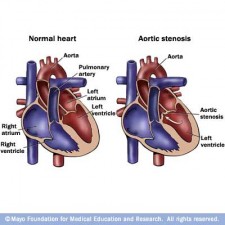What is Aortic Valve Stenosis?
 Aortic valve stenosis (AVS), or aortic stenosis, occurs when a heart’s aortic valve constricts and becomes narrowed and even deformed. AVS is more common among adults, but can appear in the form of a congenital birth defect in infants and young children. The constriction is caused by thickened and fused valve leaflets. This constricting prevents the valve from opening entirely, which hinders blood flow from the heart into the aorta and on to the remainder of the body. AVS also prevents the valves from closing entirely which causes it to leak blood as well as restrict the flow.
Aortic valve stenosis (AVS), or aortic stenosis, occurs when a heart’s aortic valve constricts and becomes narrowed and even deformed. AVS is more common among adults, but can appear in the form of a congenital birth defect in infants and young children. The constriction is caused by thickened and fused valve leaflets. This constricting prevents the valve from opening entirely, which hinders blood flow from the heart into the aorta and on to the remainder of the body. AVS also prevents the valves from closing entirely which causes it to leak blood as well as restrict the flow.
Once the aortic valve has been obstructed, the heart must work even harder to pump blood to the rest of the body. The lack of blood flow to the aorta causes a buildup of pressure which can damage the heart muscle. In due course, this extra exertion weakens the heart and confines the amount of blood it is able to pump. Aortic Valve Stenosis is rare among infants, and one cause of AVS as a congenital birth defect is the use of an SSRI (Zoloft, Prozac, Lexapro, Paxil or Celexa) during pregnancy.
Symptoms of Aortic Valve Stenosis (AVS)
Aortic valve stenosis varies anywhere from mild to severe. Aortic valve stenosis (AVS) symptoms tend to occur when the restriction of the valve is severe and may include:
- Chest pain (angina) or tightness
- Feeling faint or fainting during exertion
- Shortness of breath, especially during exertion
- Fatigue, especially during times of increased activity
- Heart palpitations — sensations of a rapid, fluttering heartbeat
- Heart murmur
The damaging effects of aortic valve stenosis may also eventually result in heart failure. Aortic valve stenosis may not show obvious warning signs immediately, which makes it hard to notice initially. Often times a doctor will discover AVS during a regular physical when the doctor notices a heart murmur. This murmur may occur long before other signs and symptoms develop.
Aortic valve stenosis typically affects adults, but has also been discovered in infants and children. Infants and children with AVS may have symptoms similar to those of adults. If you or your child experiences such signs or symptoms, see a doctor immediately, especially if you or your child has a known heart problem.
Aortic Valve Stenosis as a Congenital Birth Defect
If your child was born with Aortic Valve Stenosis (AVS ) or other birth defects and a SSRI such as Zoloft, Prozac, Lexapro, Paxil or Celexa was taken during all or part of the pregnancy, then call for a free SSRI Antidepressant Lawsuit Consultation. You and your child could have a legal right to monetary compensation for damages and injuries. Call 1-800-883-9858 for your free consultation.

